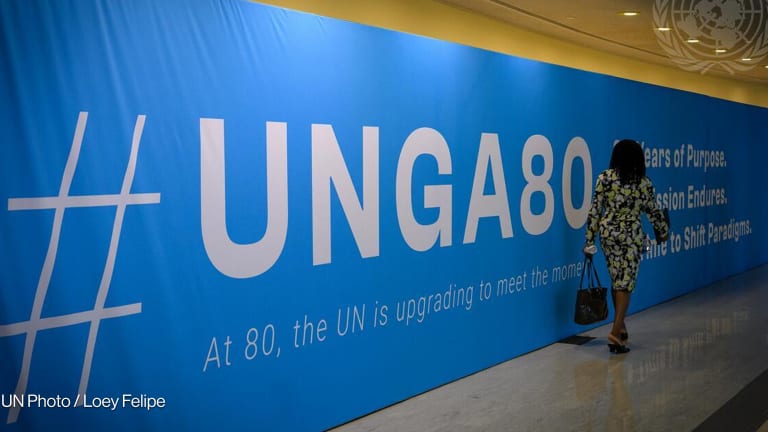
Indigenous peoples make up just 5 percent of the world’s population — about 400 million people — yet also account for nearly 15 percent of the world’s extreme poor, and occupy some 22 percent of the Earth’s land surface. Their participation in the global development agenda is key, senior United Nations officials said this week, but indigenous communities and institutions still collectively lack the right to easily enter and participate in United Nations meetings.
Indigenous peoples are working for that to change.
Gaining a permanent seat at the General Assembly for indigenous peoples’ representatives and institutions is one of the main issues driving this year’s U.N. Permanent Forum on Indigenous Issues. The annual meeting launched April 24 and runs through May 5.
A formal entry into the U.N. could help indigenous peoples shine a continued spotlight on some of the vital development issues — climate change and biodiversity, to name a few — they encounter every day back home. And it could help them influence policies, programs and funding that will impact them, as well.
“We have the same kind of concerns as the rest of the community, and to me part of it is to be able to raise our voice and issues that we are concerned with, and also to contribute to the solutions. We want to able to do that,” Rune Fjellheim, director of the Saami Parliament in Norway, explained to Devex following a press briefing.
Saami territory stretches across four countries and into the Arctic circle, encompassing 40 percent of Norway, 40 percent of Sweden and about 30 percent of Finland, according to Fjellheim. But the Saami Parliament, like some other indigenous government structures, is neither considered an NGO, nor a government (though it receives government funding).
“We are challenging, these days, the U.N. to open up the door to indigenous peoples’ representatives as a new category so we can actually get inside the door,” Fjellheim said.
“We are not challenging the concept or the charter of the U.N. We are simply asking for accreditation at the meetings.”
— Rune Fjellheim, director of the Saami Parliament in NorwayThe establishing of this new seat has been introduced as a General Assembly resolution but has not yet been determined.
This year’s forum also marked the 10-year anniversary of the U.N. Declaration on the Rights of Indigenous Peoples, a landmark framework for the survival and well-being of indigenous communities that has been adopted by most, but not all, countries — including some with significant indigenous communities, such as Colombia.
“We need to do more as a country for marginalized groups. Given resources, we can only implement actions within our means,” said Royal John Kxao, the deputy minister of marginalized communities in Namibia.
4 ways to involve indigenous communities in development projects
Indigenous people could play a crucial role in securing a sustainable future for our planet, and yet they are often underutilized. How can development organizations create meaningful partnerships with these communities?
Indigenous people are considered among the first to experience the impacts of climate change.
There are still basic issues with governments’ lack of recognition of indigenous peoples and communities, as well as the connection indigenous peoples share with their land.
And in the vulnerable Arctic region, some climate change solutions — such as renewable energy in form of biofuel projects and windmills — are paradoxically hurting indigenous peoples, as they encroach on native lands.
“We need to start a dialogue with the respect for indigenous people and their land in their respective countries,” Fjellheim said.
The indigenous peoples’ representatives and institutions would press for climate change action, but work on a case-by-case basis.
“First of all, we need to have access. We just want to contribute. And in order to contribute we need to get inside in some way. We are not challenging the concept or the charter of the U.N. or anything. We are simply asking for accreditation at the meetings,” he explained.
Read more international development news online, and subscribe to The Development Newswire to receive the latest from the world’s leading donors and decision-makers — emailed to you free every business day.








